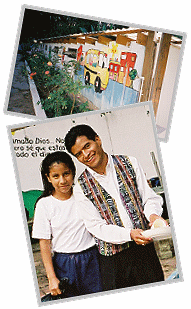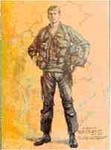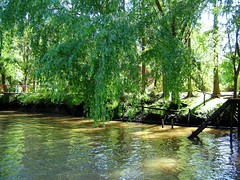WTC7 seems to be a classic controlled demolition. WTC 1 &2 destruction appears to have been enhanced by thermate (a variation of thermite) in addition. Pentagon was not struck by a passenger aircraft. It was a drone or missle.
Sunday, December 25, 2005
Capitol's Pariah on Immigration Is Now a Power - New York Times: Interesting....
WILKES FOUNDATION SUSPENDED IN CALIFORNIA: K STREET MEETS THE POWAY MAFIA
The Wilkes Foundation, a charity run by embattled San Diego lobbyist and defense contractor Brent Wilkes, was suspended last month by the California Secretary of State for failure to submit financial statements, the MadCowMorningNews has learned. The suspension of the Wilkes Foundation appears to have been anything but routine. A spokesman in the California Secretary of State’s Office stated that the last financial statement the charity filed was over three years ago, in November of 2002. Asked whether a three-year grace period was the state norm regarding financial filings, the spokesman politely demurred. News that the Wilkes Foundation has been concealing their financial records from authorities comes hard on the heels of last week’s shocking report (in the Austin-Statesman) that another Republican lobbyist-run charity, Jack Abramoff’s Capital Athletic Foundation, lied to the IRS about giving more than $330,000 in grants to charities which never received the money. | |
| |
|
|
09/11/2001
Unwarranted Controversy
Unwarranted Controversy: American Politicians, Israeli Critics, and Palestinian Textbooks
by Reema Hijazi
CNI Intern
12/16/2005
In May 2005, Senator Hillary Clinton reiterated her denunciation of what she considers incitement and anti-Semitism in Palestinian textbooks. Speaking as a distinguished guest at the American Israel Public Affairs Committee (AIPAC) Policy Conference, Senator Clinton condemned “this violence…this dehumanizing rhetoric” in the Palestinian curriculum. Clinton has preached this message before—five years ago with author Elie Wiesel, four years ago with Senator Charles Schumer in a letter to President Bush, and two years ago in a hearing with Senator Arlen Specter.
While Clinton’s message has always remained consistent, it directly contradicts academic and institutional research on the actual content of Palestinian textbooks. Contrary to the findings of American and Israeli academics, the European Union, and a congressionally commissioned inquiry carried out by the Israel/Palestine Center for Research and Information, Senator Clinton continues to issue falsehoods regarding Palestinian school texts. If Senator Clinton and other US representatives read the reports written for them, then the debate over Palestinian textbooks would finally come to a close.
The History
The controversy over Palestinian textbooks reaches back to 1994. Until that year, the Israeli Civil Administration managed the education system in the Palestinian territories. The Civil Administration assigned Jordanian books in the West Bank, and Egyptian books in Gaza, censoring the material of which it disapproved. In 1994, the Oslo accords granted Palestinians control over their own civil affairs, allowing them for the first time to control education in the West Bank, Gaza, and (to an unacknowledged extent) East Jerusalem. The newly-created Palestinian Authority (PA) faced the task of creating an independent Palestinian curriculum.
The PA immediately established the Curriculum Development Center to design the new curriculum. In the meantime, the PA continued to use the Jordanian and Egyptian books, but supplemented them with a new series of books on “National Education” for grades one through six. (Oddly, even though these books were unobjectionable in content, Israel blocked them in East Jerusalem. George Washington University Professor Nathan Brown suggests this is because using Palestinian “National Education” books in Jerusalem implicitly contested Israeli sovereignty over the city—unlike the more objectionable Jordanian books that Israel did allow.)
In 1996 the Curriculum Development Center published its 600 page report. The report directed harsh criticism toward every aspect of the educational system. It suggested methodology changes—encouraging critical thinking rather than memorization—and a holistic approach that integrated subjects into one another while maintaining relevance to the students’ environment. Significantly, the CDC operated autonomously from the Palestinian Authority. Its curriculum development team consisted of Palestinian academics, educational specialists, and teachers—not government employees. It also interviewed teachers and students directly, rather than through the Ministry of Education. The hard work of the CDC resulted in far-reaching criticisms as well as significant and detailed proposals for improvement—suggestions that have not been noted by any of the textbooks’ critics.
The CDC report became the basis for the Ministry of Education’s 1997 formal proposal, which was then approved by the Legislative Council.(1) An entirely new Curriculum Development Center, this one under the authority of the Ministry of Education, was established to write the new books. It produced first and sixth grade books in 2000, second and seventh grade books in 2001, and so on, continuing until the entire system has been converted to the new curriculum. As suggested in the report published by the first CDC, these books included the new subject of civic education, as well as lessons in human rights and democracy, and role playing games that made the students think while empowering them to make decisions.
These developments attracted little international attention, with the exception of some international support from a few European governments and UNESCO.
This changed in 1998, when an Israeli organization, the Center for Monitoring the Impact of Peace, published a report condemning Palestinian textbooks for what it claimed were inciteful and anti-Semitic passages. The Center was founded by Itamar Marcus, a resident of the Israeli settlement Efrat in the West Bank. Before founding the group, Marcus lobbied to keep West Bank water sources under Israeli control.(2) Over the past few years, the Center has alleged that “There is a systematic effort in the textbooks to demonize Israel and the Israelis.” It claims that “The Palestinian textbooks use terminology that is associated with war and violence,” and “Jihad continues to be glorified and martyrdom is praised.”(3) Because of the Center’s aggressive and effective advertising campaigns, Palestinian textbooks have been a politically attractive target ever since. Sen. Hillary Clinton, Sen. Charles Schumer, Rep. Steve Israel, the Israeli government, and pro-Israel groups have criticized Palestinian texts with information from Marcus’ Center.
However, investigations led by institutional, academic, and independent researchers have yielded a consensus in direct contrast to the Center’s findings. This consensus holds that the Palestinian curriculum is not anti-Semitic and is not inciteful to violence.
A Researched Consensus
The Coalition for the Advancement of Jewish Education published an article concluding that the Palestinians have produced “a highly nationalistic curriculum that criticizes Israel’s policies, but not its existence…To be sure, the Palestinian curriculum is not a peace curriculum. But neither is it a war curriculum or one based on anti-Semitism.”(4)
The 2003 and 2004, the United States Congress mandated an independent research group, the Israel/Palestine Center for Research and Information, to review Palestinian textbooks and present Congress with a conclusive report. Its 2003 report states, “The overall orientation of the curriculum is peaceful despite the harsh and violent realities on the ground. It does not openly incite against Israel and the Jews. It does not openly incite hatred and violence. Religious and political tolerance is emphasized in a good number of textbooks and in multiple contexts.”(5) The 2004 report continues the consensus view, stating “the textbooks promote an environment of open-mindedness, rational thinking, modernization, critical reflection and dialogue.” Furthermore, “All references that could be perceived as negative (e.g., ‘Zionist ambitions,’ ‘Israeli occupation,’ ‘Zionist settlements,’ and the like) are all made either within their historical contexts or reflect historically accurate and factual information from the point of view of the Palestinian collective narrative.”(6)
Professor Nathan Brown of George Washington University has extensively researched the new Palestinian curriculum. In his paper, Democracy, History, and the Contest Over the Palestinian Curriculum, Brown writes, “the Palestinian curriculum is not a war curriculum; while highly nationalistic, it does not incite hatred, violence, and anti-Semitism. It cannot be described as a ‘peace curriculum’ either, but the charges against it are often wildly exaggerated or inaccurate.” Professor Brown goes on to denounce vitriolic condemnations coming from the Center for Monitoring the Impact of Peace because they dismiss a more useful, accurate critique.(7)
In Ha’aretz, one of Israel’s leading daily papers, Akiva Eldar wrote, “The Palestinians are being rebuked where they should in fact be praised.” Eldar goes on to quote Dr. Ruth Firer, the head of a research team at the Harry S. Truman Institute for the Advancement of Peace at the Hebrew University of Jerusalem. Firer studied Palestinian textbooks for five years, and told Ha’aretz, “We were surprised to find how moderate the anger directed toward Israelis in the Palestinian textbooks is, compared to the Palestinian predicament and suffering. This surprise is doubled when you compare the Palestinian books to Israeli ones from the 1950s and 1960s, which mentioned gentiles [only] in the context of pogroms and the Holocaust.” Firer also noted that the new texts are freer of negative stereotypes of Jews and Israelis than the older Jordanian and Egyptian books.(8)
Matti Steinberg, while serving as the head of Israel’s Shin Bet security services on Palestinian affairs, thoroughly studied the new PA textbooks. In October 2002 he published his study, A Different View of Palestinian Textbooks, mainly in response to maligning reports by Israel’s office of the government coordinator. As reported in Ha’aretz, Steinberg claimed that the latter report’s authors were “amiss not only with regard to the facts, but also entertain exaggerated expectations.” Steinberg stated, “relative improvements were noted in the Palestinian textbooks. True, they do not contain a distinctive message of total peace and conciliation, but neither do they send a message of abysmal hatred and militancy, but restraint, which should be seen as necessary preparatory stage ahead of peace.”(9)
On the level of official political opinion, the European Union conducted its own review of Palestinian textbooks in 2001.The report states that “New textbooks, though not perfect, are free of inciteful content and improve the previous textbooks, constituting a valuable contribution to the education of young Palestinians. Palestinian Authority Ministry of Education has accepted the need for ongoing review, revision and improvement. Therefore, all allegations against the new textbooks funded by EU members have proven unfounded.”(10)
In short, the researched consensus directly contradicts the charge of incitement made so frequently by Senator Clinton and other US politicians.
Misinformation and Misled Policy
These same investigations have found serious fault with the Center for Monitoring the Impact of Peace.(11)
The Coalition for the Advancement of Jewish Education wrote, “the CMIP reports read as if they were written by a ruthless prosecuting attorney anxious for conviction at any cost.” Also, the Center’s “strongest charges are simply unsupported by a fair reading of the books.”
Indeed, the academic who has most extensively covered the international controversy surrounding Palestinian textbooks strongly criticizes the Center’s method. Brown writes, “The sensationalist charges against the Palestinian curriculum are based more on hostility than analysis.”(12) As a result, according to Brown, group’s reports are “often misleading and always unreliable.”(13)
Brown enumerates three central problems with the Center’s reports. First, the Center “generally ignores any historical context in a way that renders some of its claims sharply misleading.” In listing offensive passages from textbooks, the Center report failed to mention that the passages quoted were from Jordanian and Egyptian textbooks—not the Palestinian books under review. Second, Brown finds that the Center approaches its reviews with a “prosecutorial style. …Any evidence that contradicts the Center’s harsh message is ignored, obscured, or dismissed. …Other evidence is interpreted inaccurately.” One report points to a map of Palestine that does not show Israel’s boundaries as evidence for the denial of Israel’s existence. However, the map is topographical, showing only geographic realities and no political boundaries whatever. The Center criticizes a unit on tolerance because it omits Jews, but a reading of the unit in its entirety clearly shows that its topic is tolerance within Palestinian society. Finally, Brown observes that the largest problem lies in how the reports are read, with which he faults the Center itself. The group uses “qualifications and elliptical wording” to mislead readers, but also to avoid stating outright lies. When politicians read the reports the Center sends them, they remember what they have been misled to believe, but do not grasp any actual evidence, because it has been hidden from them. This creates situations in which politicians state outright falsehoods based on blurry Center writings. In June 2001 Senator Clinton and Senator Schumer sent a letter to President Bush stating the false charge (based on a Center report), “A book that is required reading for Palestinian six graders actually starts off stating, ‘There is no alternative to destroying Israel.’”(14) A general browbeating of Palestinian books then ensued in the United States Congress and media, based on an untrue statement.
Once inaccurate charges began circulating because of reports from the Center, hostile allegations were made against the European Union for funding the supposedly offensive textbooks. The EU in fact provided no funding for the books. Some EU member states contributed independent funding, but the European Union was forced to answer false charges. Under such pressure, the EU conducted its own review of the books, concluding, “Quotations attributed by earlier CMIP reports to the Palestinian textbooks are not found in the new Palestinian Authority schoolbooks funding by some EU Member States; some were traced to the old Egyptian and Jordanian text books that they are replacing, some to other books outside the school curriculum, and some not traced at all. While many of the quotations attributed to the new textbooks by the most recent CMIP report of November 2001 could be confirmed, these have been found to be often badly translated or quoted out of context, thus suggesting an anti-Jewish incitement that the books do not contain.”
In her new book, Inheriting the Holy Land: An American’s Search for Hope in the Middle East, Jennifer Miller interviews personalities and officials involved in the textbook controversy. She visits the Center for Monitoring the Impact of Peace in Jerusalem, and what she writes is worth quoting at length: “my main criticism of CMIP: Its reports do not always clarify whether the quotations they cite come from the new Palestinian Authority textbooks or from the Egyptian and Jordanian books used prior to 2000. In fact, the material that Israel and the US Congress call so blatantly offensive—that the Palestinians books equate Zionism with Nazism—appears in an eleventh-grade Jordanian text. …Similarly, nowhere in the new Palestine Authority books do any words call for Israel’s destruction. This kind of incitement simply does not exist. While there are illustrations of bulldozers demolishing houses and armed soldiers, it’s the real-life versions of these pictures that truly influence students.”(15)
Miller even found that those working at the Center did not believe their own reports. She writes: “I asked Yohanan Manor, CMIP co-director, point-blank if he thought these images or anything else in the Palestinian books incited students to violence. He said no. Both he and Groiss [author of CMIP textbook reports] admitted that the new PA books are a huge improvement over those in other Arab countries.”
In the end it is clear that the Center writes dubious reports that mislead its readers into believing falsehoods. These falsehoods cause international controversy, and in turn, spur politicians into defaming the Palestinian educational system undeservingly. Because American politicians have relied on CMIP reports for their information on Palestinian textbooks, they have leveled inaccurate, and oftentimes false allegations against Palestinian educators and officials. They have put American international influence behind these allegations, and hence put Palestinians through a damaging, unnecessary, and unfair trial.
Had these representatives and their staffs varied their sources for information—as any researcher should do—they could have avoided this unwarranted controversy altogether.
Power and Double Standards
The debate over textbooks is really one of power, and in the end, self-determination. Palestinians do not, and cannot censor, or even critique Israeli textbooks, and the world does not ask for a Palestinian opinion. Israeli criticisms, on the other hand, play a large role in the international debate concerning Palestinian texts; because of Israel's special relationship with the United States, American politicians allow, and oftentimes actively enable Israeli concerns to influence Palestinian curriculum. Unlike any other nation, Palestine must undergo tight scrutiny when espousing ideas of nationalism and patriotism—in textbooks and elsewhere.
As a case in point, the nationalism found in Palestinian textbooks has been interpreted as hostility toward Israel, and even the denial of its existence. Critics have attacked the textbooks for ubiquitous use of Palestinian flags and other symbols. Indeed, Brown, Firer, and other researchers have also noted the pronounced prominence of nationalist symbols in the books. However, the consensus among non-CMIP researchers holds that this nationalism does not represent threats to Israel, nor does it take an aggressive tone. In fact, the researchers point out that nationalist symbolism is common in any series of public textbooks.
Israeli Professor Eli Podeh, author of The Arab-Israeli Conflict in Israeli History Textbooks, 1948-2000, writes that Israeli textbooks and curricula up until the mid 1990s were “approached entirely within the context of the Zionist struggle against the Arabs.”(16) Discussing Palestinian texts, he has said, “The Palestinians suffer from the same problems we did. If the role of their books is to inculcate national identity and attachment to the land, then their books must be very nationalistic. It happens during the first stages of building a state. Perhaps the current Palestinian books should be compared to the first generation books in Israel and not the third.”(17)
That is exactly what Ruth Firer did when conducting her research on the Palestinian books, as discussed above. She was surprised at the moderation she found in Palestinian books, and astounded when she compared them to Israeli books. “Israeli books, especially those published from the 1980s on, include almost no derogative stereotypes of Arabs and Palestinians, but the basic narrative is still the same, at least until the mid 1990s. The change in the Zionist narrative, which portrayed Israelis as heroic, pioneering people, was prompted by the publications of the New Historians. Wherever this does occur, it is usually on a very small scale, and sometimes as an afterthought to the traditional narrative.”(18)
Israeli textbooks did not and do not receive the same international attention that Palestinian books receive. Palestinian textbooks do deserve criticism, but the exaggerated claims currently leveled against them constitute a double standard rather than researched analysis.
Self-Determination
Policy makers believe they are arguing over the content of Palestinian books, but do not make themselves aware of that content. The books teach the Palestinian narrative, which has become condemned because of misinformation. As such, the controversy over Palestinian textbooks has become a debate over whether the Palestinian narrative can be taught in Palestinian books.
As Nathan Brown writes, “in a sense, the content of the books does not matter; the controversy is driven far more by the broader conflict than by specific issues with the books themselves…as long as the textbooks do not repudiate the Palestinian point of view, they will always remain suspect in some eyes.”(19)
The scrutiny of Palestinian teachers and academics should be sufficient to deem the books acceptable, and the books certainly have received much constructive criticism from within Palestinian society. However, the international power system demands non-Palestinian analysis. This third-party analysis has been completed, with an overarching consensus coalescing among many independent researchers, but the politicians who have demanded such research do not respond to it.
Such negligent scrutiny is insulting to Palestinians, who for the first time are able to teach their youth themselves. After decades of Israeli dominance, and still under Israeli occupation, they are faced with illegitimate hurtles instead of legitimate criticism.
In the end, it seems that the textbooks’ most virulent critics expect Palestinians to write a text that embraces their oppressors. Though a peace-loving curriculum is absolutely an ideal for which to strive, books that can be described as “neither peace, nor war” books are a promising reality, as the conflict still looms. As Professor Sami Adnan of Bethlehem Univeristy, who co-researched textbooks with Firer, has said, “How can a Palestinian write in a textbook that Israelis or Jews should be loved, while what he is experiencing is death, land expropriation, demolition of homes and daily degradation? Give us a chance to teach loving. [That will happen] when they stop seeing Israelis as soldiers or bulldozer operators. Let us breathe. Give us a chance to love you.”(20)
Conclusion: Power in Scholarship
Palestinian textbooks merit criticism, but not the type of criticism currently leveled at them. As American, Israeli, and Palestinian researchers have demonstrated, the common allegations against the books do not withstand basic scrutiny. Furthermore, other countries do not have to defend their schoolbooks to the rest of the world. Palestinians, on the other hand, have their texts scrutinized by the United Nations, the European Union, the United States, and Israel. Palestinians must also contend with a massive power imbalance: while Palestinian books are held to certain standards by Israeli and American reviewers, Palestinian reviews of Israeli texts are unheard of, and in any case, never requested by the international arena.
Yet even with the unwarranted international pressure, Palestinian textbooks have lived up to standards of education and decency as articulated by the European Union, the Israel/Palestine Center for Research and Information, prominent American academics, as well as Israeli textbook specialists.
Politicians have allowed themselves to be misinformed. If Senator Clinton and other US representatives read the reports written for them, rather than relying on only one dubious source, then the debate over Palestinian textbooks would transform into a consensus. We could then turn our attention from Palestinian textbooks to the dilapidated condition of Palestinian schools, or the serious lack of educational resources for Palestinian children.
By speaking knowledgably about the topics on which they take action, American politicians could effect positive change in the Israeli-Palestinian conflict, where misinformation is in abundance. Thorough research and attention to scholarship is key. By overlooking these basic steps in the case of Palestinian textbooks, American politicians have only added fuel to an illusionary fire. If we make a point of knowing the content of the books in question, and of questioning educators rather than prosecuting them based on dubious information, we can build up the Palestinian educational system, rather than work to undermine it.
NOTES
(1) Both Professor Nathan Brown (Democracy, History, and the Contest Over the Palestinian Curriculum) and Jennifer Miller (Inheriting the Holy Land) detail the contentions of the CDC report, as well as its effects on the writing of the new Palestinian books—the report’s criticisms were so far-reaching that they appeared too progressive to the Ministry of Education. As such, the report had influence on the development of the curriculum that was eventually approved, but less influence than the report’s authors had hoped. However, The teachers and academics who proposed the changes continue to push for their fulfillment.
(2) See Brown, Democracy, p 3, and Akiva Eldar, “What did you study in school today, Palestinian Child?” Ha’aretz, Jan 2, 2001.
(3) Arnon Groiss, Jews, Israel and Peace in Palestinian School Textbooks, the Center for Monitoring the Impact of Peace, November 2001 and May 2003.
(4) This summary originally appeared in “Teaching about Terrorism, published by the Coalition for the Advancement of Jewish Education. It can be found online at http://www.geocities.com/nathanbrown1/CAJE.htm
(5) The Israel/Palestine Center for Research and Information, Report I: Reviewing Palestinian Textbooks and Tolerance Education Program, submitted to the Public Affairs Office US Consulate General, Jerusalem, March 2003, p 5.
(6) The Israel/Palestine Center for Research and Information, Report II: Reviewing Palestinian Textbooks and Tolerance Education Program Grades 4 & 9, submitted to the Public Affairs Office US Consulate General, Jerusalem, June 2004, p 7, 5.
(7) Brown, Democracy, History, and the Contest Over the Palestinian Curriculum 2001, p 1, 8.
(8) Akiva Eldar, “What did you study in school today, Palestinian Child?” Ha’aretz, Jan 2, 2001.
(9) Akiva Eldar, “Reading, Writing—and Propaganda,” Ha’aretz, Oct 9, 2004.
(10) Found online at http://europa.eu.int/comm/external_relations/mepp/faq/heads_%20mission_schoolbooks.pdf
(11) All Center for Monitoring the Impact of Peace reports can be found at www.edume.org. A point by point comparison of the Center’s claims and the actual texts is beyond the scope of this paper. For such a comparison see Fouad Moughrabi, “The Politics of Palestinian Textbooks,” The Journal of Palestine Studies, v. 31, n1, Autumn 2001.
(12) Brown, Democracy, p 9.
(13) For correspondences between Nathan Brown and the Center for Monitoring the Impact of Peace, see http://www.geocities.com/nathanbrown1/Response_CMIP.html.
This includes detailed quotations and analysis of the textbooks on behalf of both authors.
(14) Brown, Democracy; for Brown’s analysis of the Center for Monitoring the Impact of Peace, see 3-6. Discussion concerning Senator Clinton’s letter begins on 7. Professor Brown goes to great lengths explaining the original contention made by CMIP about the phrase allegedly found in a school text, and the extensive research done by himself and two other scholars, all of whom searched for the book and specific edition that was supposed to contain the phrase. According to this in-depth search, no edition of the book includes such a phrase. See also, Fouad Moughrabi, “The Politics of Palestinian Textbooks,” The Journal of Palestine Studies, v. 31, n1, Autumn 2001.
(15) Jennifer Miller, Inheriting the Holy Land: An American’s Search for Hope in the Middle East, Ballantine Books, 2005, p 57.
(16) Eli Podeh, The Arab-Israeli Conflict in Israeli History Textbooks, 1948-2000, New York: Bergin and Garvey, 2002, p 32.
(17) Miller, Inheriting the Holy Land, p 65.
(18) Eldar, “What did you study in school today, Palestinian Child?” New Historians are the Israeli historians who literally rewrote Israeli history in the 1980s after the opening of the Israeli archives. See books by Benny Morris, Avi Shlaim, and Ilan Pappe.
(19) Nathan Brown, "The International Controversy Regarding Palestinian Textbooks," delivered to the Georg-Eckert Institute for International Textbook Research, Dec 2002.
(20) Eldar, “What did you study in school today, Palestinian Child?”






 clear message that whatever official sanction he enjoyed has been removed.
clear message that whatever official sanction he enjoyed has been removed.  involved in the fraudulent schemes of “Cunningham Wilkes et al” to divert money from America’s national defense to purchase mansions, Rolls Royces, Lear jets and yachts.
involved in the fraudulent schemes of “Cunningham Wilkes et al” to divert money from America’s national defense to purchase mansions, Rolls Royces, Lear jets and yachts. he government later used him as a witness in a celebrated payola case, but the judge berated the government, saying Di Ricco's testimony varied widely from the testimony in his own case.
he government later used him as a witness in a celebrated payola case, but the judge berated the government, saying Di Ricco's testimony varied widely from the testimony in his own case.  promoter indicted after he was seen meeting with members of the Gambino Mafia family in New York in 1986.
promoter indicted after he was seen meeting with members of the Gambino Mafia family in New York in 1986.